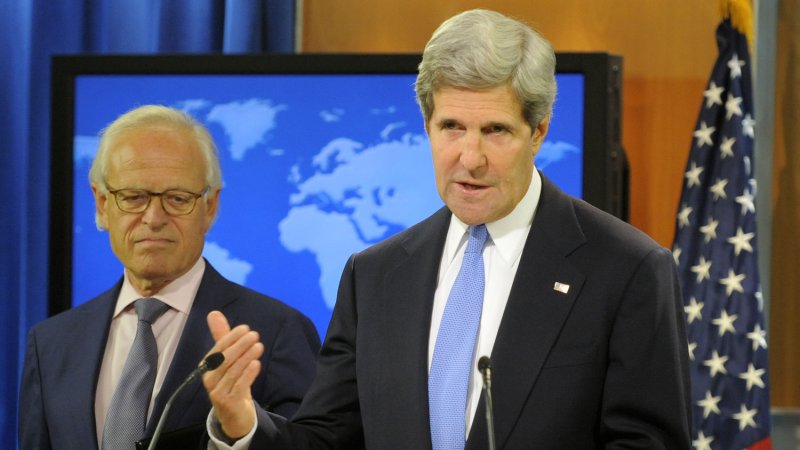1 of 3 | US Secretary of State John Kerry (R) announces the resumption of peace talks to be headed by former American Ambassador to Israel Martin Indyk, (L), between Israel and the Palestinian Authority during a briefing at the State Department, July 29, 2013, in Washington, DC. Kerry will be meeting later in the evening with Israeli Justice Minister Tzipi Livni and Palestinian Chief Negotiator Saeb Erekat in an attempt to lay the ground work for progress in the Middle East. UPI/Mike Theiler |
License Photo
WASHINGTON, July 29 (UPI) -- The resumption to face-to-face discussions between Israeli and Palestinian negotiators in Washington brought praise from U.S. President Obama Monday.
Obama said in a statement issued by the White House that the arrival of senior negotiating teams in Washington for the first round of meetings aimed at eventually arriving at a peace agreement "is a promising step forward, though hard work and hard choices remain ahead."
Obama said he had "experienced first-hand the profound desire for peace among both Israelis and Palestinians" when he visited the region in March.
"The most difficult work of these negotiations is ahead, and I am hopeful that both the Israelis and Palestinians will approach these talks in good faith and with sustained focus and determination," Obama said. "The United States stands ready to support them throughout these negotiations, with the goal of achieving two states, living side by side in peace and security."
The negotiators for the two sides are laying the groundwork for the first formal peace negotiations in three years, the State Department said.
The resumption of direct talks came with a steep and emotional price for Israeli leaders. The Israeli Cabinet voted to release 104 Palestinian prisoners, many who were convicted of killing Israelis, a deeply controversial decision particularly among relatives of those killed by Palestinian bombings.
Abbas and his leadership refused to return to the negotiating table without their release.
After the vote, U.S. Secretary of State John Kerry spoke with Palestinian Authority President Mahmoud Abbas and Israeli Prime Minister Binyamin Netanyahu to formally invite them to send their negotiating teams to Washington.
"Both leaders have demonstrated a willingness to make difficult decisions that have been instrumental in getting to this point," Kerry said in a statement. "We are grateful for their leadership."
Israel is represented in the preliminary stages by Justice Minister Tzipi Livni and Netanyahu special envoy Isaac Molho. They both arrived in Washington Monday.
The Palestinians will be represented by chief negotiator Saeb Erekat, who negotiated the 1993 Oslo Accords with Israel, and Abbas chief adviser Mohammed Shtayyeh.
The sides were to meet Monday evening at an Iftar dinner, the evening meal when Muslims break their fast during the Islamic month of Ramadan. The somewhat informal dinner will be hosted by Kerry, who has made an intensive effort to revive the moribund talks.
The New York Times said the dinner would be at the State Department. Israeli newspaper Haaretz said it would be at Kerry's Washington residence.
The talks are to continue at the State Department Tuesday. At their conclusion, Kerry is expected to release a statement announcing the start of full negotiations, with the next round of talks expected to be in the Middle East.
Former U.S. Ambassador to Israel Martin Indyk has been appointed the U.S. special envoy to oversee the talks, CNN reported.
Indyk, the Brookings Institution's foreign policy director, was the ambassador to Israel during the Clinton administration. Upon being appointed to oversee the talks, Indyk recalled a computer screensaver his son made that asked a simple question: "Dad, is there peace in the Middle East yet?"
"For 15 years, I've only been able to answer him, 'Not yet,'" Indyk told reporters. He expressed hope the newest round of talks would make progress.
Netanyahu called the decision to release the prisoners -- many convicted of killing Israelis -- "painful for the entire nation."
"But there are moments in which tough decisions must be made for the good of the country, and this is one of those moments," he said.
After more than 5 hours of deliberations Sunday, 13 ministers voted in favor of the release, seven opposed it and two abstained.
The prisoners are viewed by Israelis as terrorists and by Palestinians as prisoners of war. Some are serving life sentences. All have been in prison for at least two decades.
They are to be freed in groups, with the pace of the releases dependent on progress in the talks.
The Israeli Cabinet also approved Netanyahu's call for a national referendum that would allow voters to approve or reject any peace deal he makes.
Erekat described the prisoner-release decision in a statement as "an overdue step toward the implementation of the Sharm el-Sheik agreement of 1999." He added, "We welcome this decision, 14 years later."
The Sharm el-Sheik agreement between Israel and the Palestine Liberation Authority included the release of Palestinian prisoners from Israeli military jail.
The accord was overseen by the United States and witnessed and co-signed by Egypt and Jordan.
Erekat also called on Israel "to seize the opportunity ... to put an end to decades of occupation and exile and to start a new stage of justice, freedom and peace for Israel, Palestine and the rest of the region."















